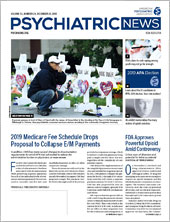Phase 2 Study Suggests Adjunct Pimavanersin Improves MDD Symptoms
Acadia Pharmaceuticals in October announced that pimavanserin was effective at reducing depressive symptoms when given as an adjunct treatment to adult patients with treatment-resistant depression. Pimavanserin, which is a selective serotonin inverse agonist, is FDA approved for the treatment of Parkinson’s disease psychosis.
The findings came from a phase 2 study that involved 207 adult patients with major depressive disorder and an inadequate response to first-line therapy with a selective serotonin reuptake inhibitor (SSRI) or serotonin norepinephrine reuptake inhibitor (SNRI).
The participants were randomly assigned to receive either 34 mg pimavanserin (n=51) or placebo (n=156) daily in addition to their existing SSRI/SNRI therapy for five weeks. After five weeks, the 58 patients in the placebo group who did not show a treatment response were re-randomized to receive pimavanserin or placebo for a second five-week period.
After the first five-week stage, pimavanserin was superior to placebo at reducing depressive symptoms, as measured by the 17-item Hamilton Depression Rating Scale. Pimavanserin was also superior to placebo for several secondary endpoints, including sleepiness, impulsiveness, and sexual functioning. The stage 2 results showed no difference between pimavanserin and placebo.
Pimavanserin was generally well-tolerated, and minimal serious adverse events were reported. Discontinuations due to adverse events were 1.2 percent for pimavanserin and 3.2 percent for placebo.
Pfizer Creates Company for CNS Drug Development
Pfizer has followed through on its plan to exit neuroscience research. The company announced in October that it was creating a new biopharmaceutical company called Cereval to continue to investigate several Pfizer compounds designed to target central nervous system (CNS) disorders. Pfizer will retain 25 percent equity in Cereval as part of the spinoff.
The most advanced drug in the pipeline of newly formed Cerevel is PF-06649751, a dopamine 1 receptor modulator that will be tested in a phase 3 study for the treatment of Parkinson’s disease next year. Cereval has also obtained two drugs ready to start phase 2 clinical trials: an acetylcholine receptor modulator being tested for psychosis and a GABA receptor–targeting drug for epilepsy.
The remainder of Pfizer’s donated assets are all in the preclinical stage and include additional drug candidates for the treatment of Parkinson’s and psychosis, as well as molecules for treating substance use disorder and neuroinflammation.
Schizophrenia Drug Has Favorable Weight Profile in Phase 3 Trial
In November Alkermes announced the results from ENLIGHTEN-2, a phase 3 trial of its investigational schizophrenia drug ALKS 3831. Patients with schizophrenia who took ALKS 3831—a combination of olanzapine and the opioid receptor antagonist samidorphan—for six months did not gain as much weight as those taking olanzapine alone.
The trial involved 561 patients with stable schizophrenia and was designed to compare weight gain with ALKS 3831 with that of olanzapine alone over six months.
Patients in the ALKS 3831 group met both primary endpoints for the trial: they had a lower mean percent weight gain at six months compared with those in the olanzapine group, and a lower proportion of patients who gained 10 percent or more of their baseline body weight at six months.
The difference in weight gain between the two groups became apparent after the fourth week, and their rates of weight gain continued to diverge for the study’s remainder. At the sixth week, weight stabilized in the ALKS 3831 treatment group and remained flat for the rest of the study period.
Alkermes plans to submit a New Drug Application to the Food and Drug Administration in 2019.
Congress Passes Bills Banning Pharmacy ‘Gag Clauses’
Congress in October passed two laws that ban pharmacy “gag clauses,” which health insurers use to prevent pharmacists from informing patients how they can pay less for prescription drugs.
The pharmacy gag clauses were previously included in contracts between pharmaceutical benefit managers and drug companies, who work together to negotiate drug prices on behalf of insurance companies and other health care payers. In some cases, the out-of-pocket price of the drug is less than a patient’s insurance copayment, but the gag clauses prevent pharmacies from disclosing this information.
The Patient Right to Know Drug Prices Act and the Know the Lowest Price Act prohibit the use of such clauses in pharmaceutical agreements. The Patient Right to Know Drug Prices Act applies to people covered by private health insurance and is already in effect; the Know the Lowest Price Act applies to patients on Medicare and will go into effect in January 2020. ■
